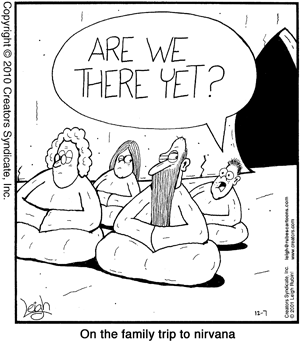Tickling and Enlightenment
/Meditate as if you are being tickled, but don’t respond to the tickling, pretend you are immune. If you’ve ever been the victim of tickling over an extended period of time, years in my case, you probably noticed at some point that it is possible to use Vulcan-mind-lock to feel the tickling, but not respond to it. I developed this skill because I had to deal with my older sister tickling me. She tickled me mainly because she hadn’t ever heard about water-boarding. The basic goal of tickling is to get one’s sibling’s organs to explode.
Once I developed the Vulcan-mind-lock skill, my sister quickly discovered that tickling me was boring, and she moved on to more sophisticated forms of torture.
This is why people have trouble meditating. Meditating is a lot like being tickled. People often think the tickling experience is going to stop when they get better at meditating. When it doesn’t, they think they have failed, and quit. If anything the tickling experience is likely to become more profound.
Widespread confusion about meditation also explains why many people find the golden-elixir (jindan/neidan) practice so mystifying. Judging by the number and variety of descriptions of neidan and jindan--and we are taking about tens of thousands before the twentieth century--I think it is fair to say neidan is an enlightenment practice invented by people with ADHD (Attention Deficit Hyperactivity Disorder).
 A great direction for scientific inquiry in the next few years would be to explore the relationship between ADHD and tickling. The mindfulness-meditation in the schools movement is great because it is directly addressing nervous system re-orientation problems. Basically, we can think of it as a way to trick disruptive kids into tickling themselves. Very cool.
A great direction for scientific inquiry in the next few years would be to explore the relationship between ADHD and tickling. The mindfulness-meditation in the schools movement is great because it is directly addressing nervous system re-orientation problems. Basically, we can think of it as a way to trick disruptive kids into tickling themselves. Very cool.
Given all this, and my own self-induced ADHD, let me try (again) to explain jindan (the golden-elixir). Once the experience of emptiness has been established by giving-in to the experience of being tickled all over one’s body for an hour every day for a year, then it is possible to transition to maximum explosive felt spatial imagination, called shenling (神靈), in Chinese. Maximum-explosive-felt-imagination, that’s a lot of words strung together! Well, if that doesn’t work, I give up. You may be on your own.
Here is the monster in the room--people get good at meditating, standing or sitting, whatever; just like people get good at sitting in a chair in school and shutting off the learning hormones, known colloquially as playfulness. Don’t get good at meditating! That was the whole freaking point of Suzuki Roshi’s Zen Mind, Beginner's Mind. Instead give-in to being tickled on every spot of your body, inside and outside, that is what perfection feels like. Surrender, not retreat; in the moment, not in-control.
Of course, I’m not pushing perfection. Maybe you don’t want that? Maybe it isn’t right for you? Perhaps you like to walk around art galleries with your nose upturned sipping wine and nibbling cheese. That’s cool.
It is a bit like insults. I encourage students to insult each other early and often. Complements too. I also jibe my students towards mastery of the self insult and the self complement. See, this is what enlightenment looks like when it is expressed and performed. It isn’t neutral, dead, or boring. It isn’t all blissed-out. Daoist enlightenment, and I suspect most other types, too, identifies the fruition as: without preference.
The practice of meditation is to experience the way things are without preference. The expression of that experience is to act without preference. I mean, how do you know a Buddha when you meet him? He has gangly arms so long they touch his knees, he has been sitting still so long his hair is full of snails, his ear lobes are long enough to bat flies off of his shoulders, when he walks through mud, lotus flowers bloom in his footsteps.
Seriously, if you want to be enlightened, start seeing these qualities in the people around you and commenting on them. Why not start by telling the stranger sitting next to you on the airplane that you fart rainbows, and then ask them if they like being tickled? Or perhaps enlightenment is just too creepy for you?
For my martial arts readers who don't practice meditation, think about it this way, there are two major obstacles to learning martial arts: 1) Fear of being hit; including fearfulness before, during and after being hit, and 2) Fear of hitting; also before, during and after. Meditation is similar, there are two obstacles: 1) Fear of stillness, and 2) Fear of movement.
